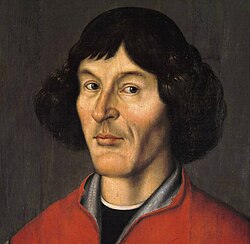Portal:Stars/Selected biography/3

Nicolaus Copernicus (19 February 1473 – 24 May 1543) was the first astronomer to formulate a comprehensive heliocentric cosmology, which displaced the Earth from the center of the universe. Nicolaus Copernicus was born on 19 February 1473 in the city of Toruń (Thorn) in Royal Prussia, part of the Kingdom of Poland.
Copernicus' epochal book, De revolutionibus orbium coelestium (On the Revolutions of the Celestial Spheres), published just before his death in 1543, is often regarded as the starting point of modern astronomy and the defining epiphany that began the scientific revolution. His heliocentric model, with the Sun at the center of the universe, demonstrated that the observed motions of celestial objects can be explained without putting Earth at rest in the center of the universe. His work stimulated further scientific investigations, becoming a landmark in the history of science that is often referred to as the Copernican Revolution.
Among the great polymaths of the Renaissance, Copernicus was a mathematician, astronomer, physician, quadrilingual polyglot, classical scholar, translator, artist, Catholic cleric, jurist, governor, military leader, diplomat and economist. Among his many responsibilities, astronomy figured as little more than an avocation – yet it was in that field that he made his mark upon the world.

